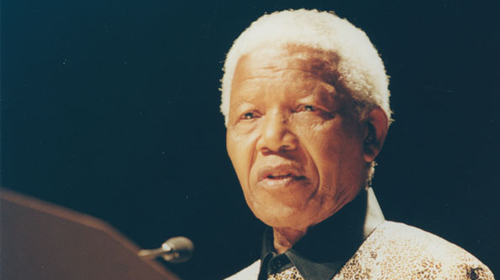
Today's worldwide celebrations of international Human Rights Day coincide with the commemoration of the life and legacy of the late Nelson Mandela – the freedom fighter, political prisoner, African National Congress leader, and first president of post-apartheid South Africa.
More than 90 world leaders, including Barack Obama attended Mandela's today, where the president gave a passionate eulogy, telling tens of thousands that Mandela "speaks to what's best inside us."
Mandela was a giant in the international human rights movement, which strongly opposed the oppressive apartheid regime and championed the call for his release from prison. For the human rights movement, Mandela will forever be an icon for universal equality, freedom and justice, and the global fight against HIV/AIDS.
Mr. Mandela's legacy should serve as a guide to leaders as they pay their respects and rightly praise his moral global leadership. This offers the perfect opportunity to consider how the United States can improve its own human rights record and ensure that "what's best inside us" extends to every sector of society. Here are a few ways the U.S. government can begin to honor that legacy:
- Reconsider how the United States puts individuals on terrorism watch lists and provide meaningful process for removal of those wrongly listed. Mandela was only removed from U.S. ;
- Take more robust domestic action to address poverty and racial economic disparities; turn the rhetoric from Obama's recent into action;
- Pursue accountability for the torture and abuses perpetuated by the Bush administration and provide redress to victims;
- Take a leadership role in eliminating the death penalty and inhumane and counterproductive use of prolonged solitary confinement in the United States;
- Recall Mandela's courageous support of the fight against HIV/AIDS and end the criminalization of people with HIV/AIDS in the United States.
- Honor the legacy of Mandela by supporting the U.S. ratification of the Rome Statute and joining the , which would reaffirm the U.S. commitment to international justice.
- Eliminate measures restricting the human right to vote, whether through or restrictive voter ID laws;
- Issue an on Human Rights to fully implement ratified human rights treaties like the and withdraw U.S. opposition to the Durban Declaration and Plan of Action.
- End indefinite detention and close the prison at Guant√°namo Bay, by lifting restrictions on transfer of detainees. Detainees who have been cleared for transfer should not be sent to their home countries or a third country if the detainee would be in danger of being tortured or abused if sent home, and detainees whom the government seeks to prosecute should be transferred to federal court if there is evidence against them that is untainted by torture.
For more, read our updated fact sheet, "What You Should Know ¿œ∞ƒ√≈ø™Ω±Ω·π˚ The U.S. And Human Rights".
These are daunting tasks that require strong political will. To start, our struggle requires a strong domestic human rights movement and public support in favor of fundamental change and structural reforms that live up to Mandela's ideals and principles. Together, we can build a society and human family that truly honors the courageous life of Nelson Mandela. Together we can ensure that world leaders, including the United States, place human dignity and human rights at the center of their priorities and actions. Only then will Madiba's legacy truly be honored.
Learn more about human rights and other civil liberty issues: Sign up for breaking news alerts, , and .

